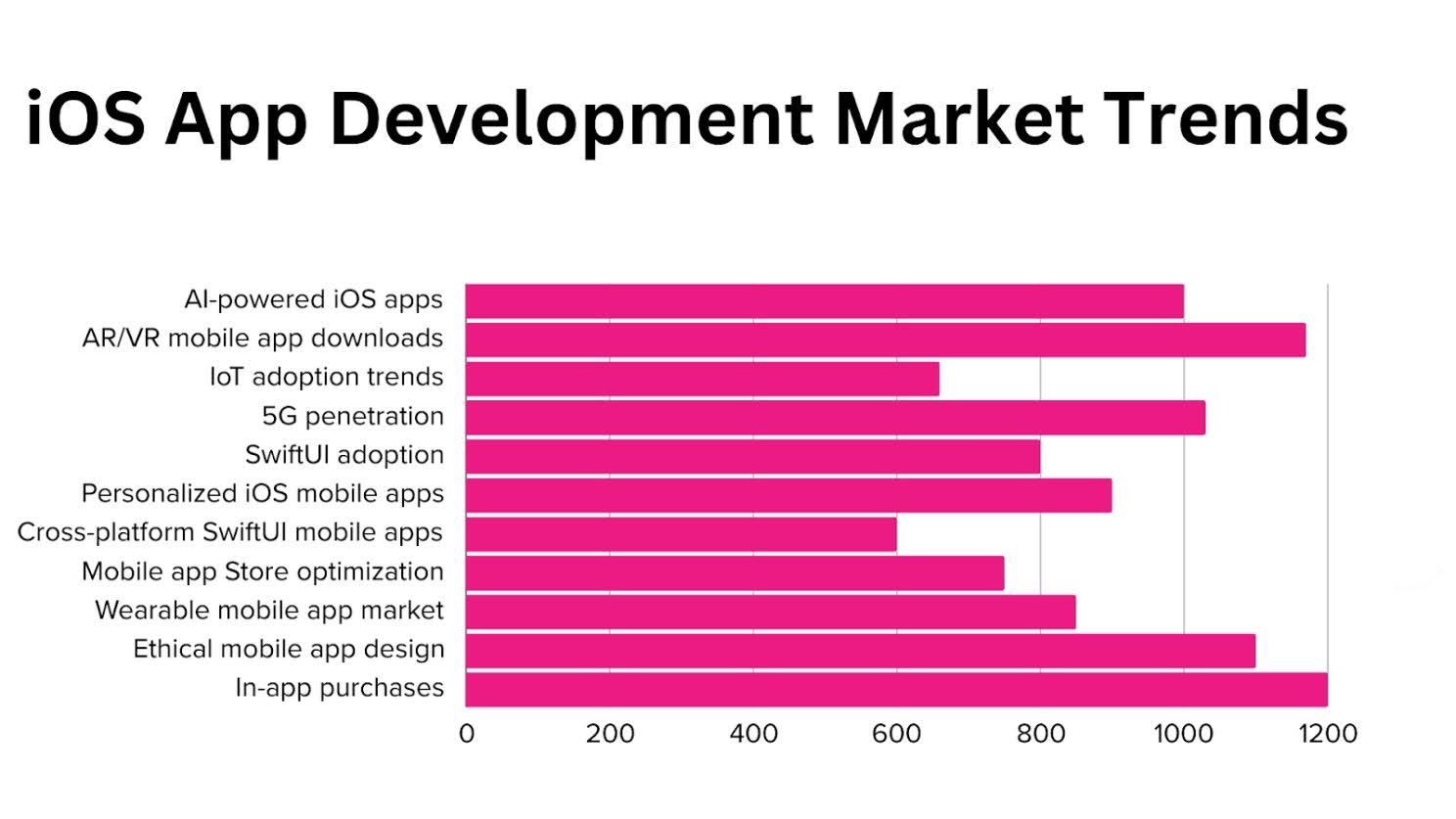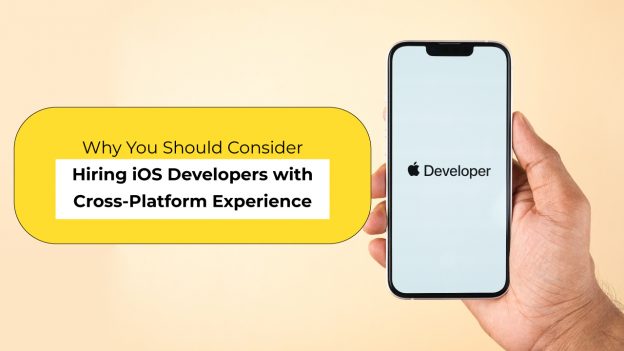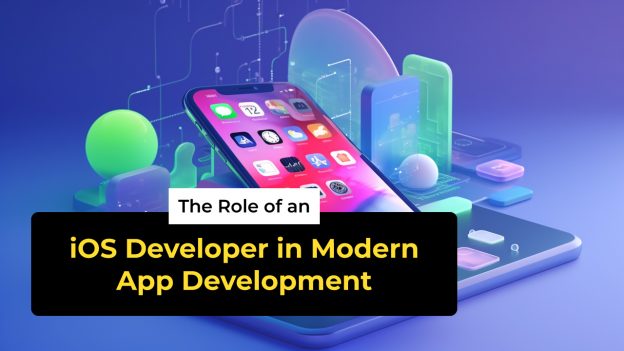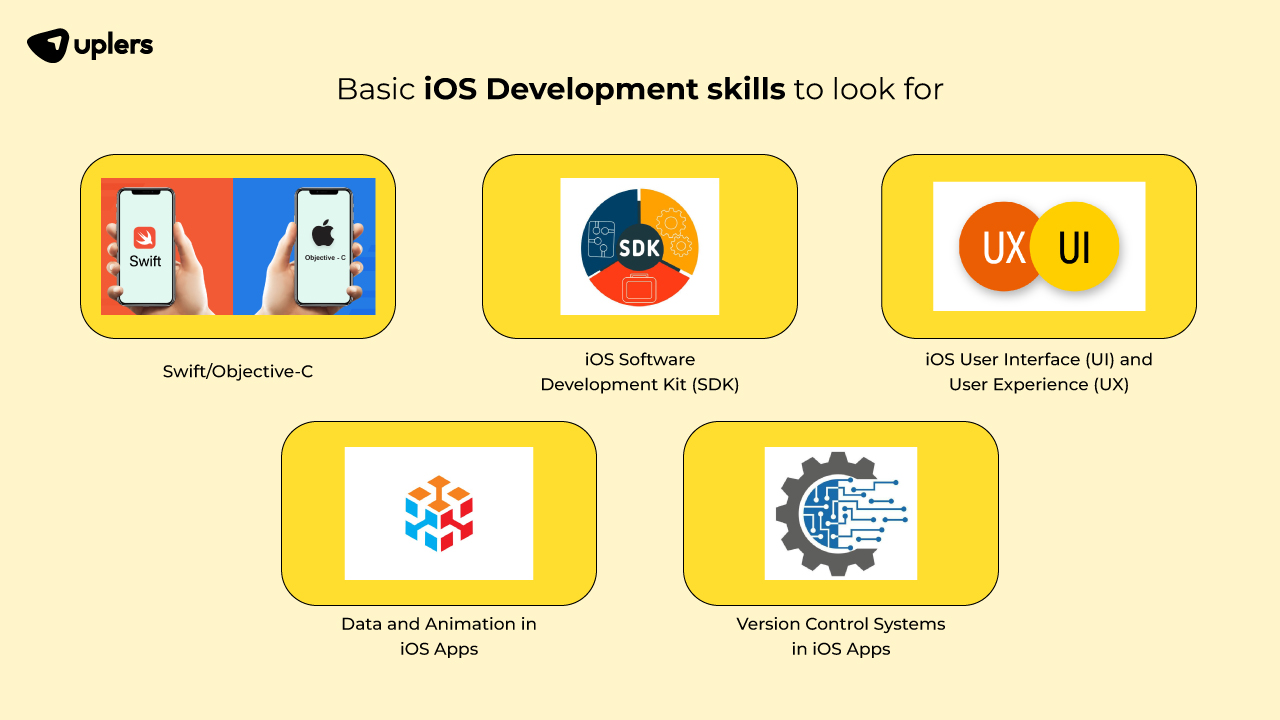The App Store is full of innovative iOS app development trends. The worldwide iOS app industry is expected to reach $240 billion by 2023 and continue to expand until 2030.
While competition is fierce, staying ahead of the curve with the latest iOS features and trends can give your app a significant edge.
Knowing the most recent developments in iOS programming is critical for various reasons. For example, it encourages you to create apps that seem new and ‘different.’ This will also help you remain ahead of your competition on the app store.
This will provide you with the knowledge needed for iOS app development trends and help you hire iOS developers that are skilled. Prepare to turn your app concept into a reality and take hold of this exciting industry.
Key Trends in iOS Development

1. AI and Machine Learning Integration
AI and ML are no longer futuristic notions. They are modifying how applications function. You can utilize AI and ML to tailor user experiences in your app. You can also automate processes and make predictions using AI and ML skills and data.
2. Augmented & Virtual Reality
Remember when Pokémon Go first blew you away? That technology is augmented reality (AR). AR uniquely enhances user experiences. It incorporates computer-generated features with the actual environment. In contrast, VR immerses users in a virtual environment. In any scenario, there is potential for industry transformation. This encompasses gaming and entertainment, education, and healthcare.
3. SwiftUI Adoption
Apple’s SwiftUI framework is gaining favor among developers. The declarative UI framework streamlines the process of designing an app’s interface. A developer can use SwiftUI to specify how the user interface should appear. The framework manages the underlying code to ensure that it functions, simplifying development and resulting in more elegant and maintainable codebases.
4. Additional App Security Features
Given the increasing number of mobile vulnerabilities, robust app security is more vital than ever. Developers are implementing more stringent authentication features, including biometrics like fingerprint and face recognition. They also utilize secure coding to ensure user data is safe and does not wind up in inappropriate areas.
5. Cross-Platform Development Tools
Developing separate apps for iOS and Android can be a time-consuming and laborious process. This is where cross-platform development tools come in. They allow you to write a single codebase that works across multiple platforms, saving significant time and effort. However, these tools are most effective for applications where platform-specific features are minimal.
Key Skills to Look for When Hiring
Hiring the appropriate iOS developer is critical to the success of your application. Here are some essential technical and soft skills to consider when you hire iOS developers:

Programming Skills
In-depth understanding of Swift syntax, best practices, and object-oriented programming concepts. Experience with frameworks like SwiftUI to leverage their development process improvements.
Data Management Skills
A strong grasp of Core Data, Apple’s architecture for persistent data storage within applications. Solid knowledge of networking fundamentals for data communication between the app and external servers.
Augmented Reality/Virtual Reality Skills
Familiarity with ARKit and RealityKit for developers working on apps with AR or VR functionalities.
Problem-Solving Skills
The ability to break down complex problems, identify root causes, and implement effective solutions.
Communication Skills
The ability to clearly explain technical concepts to both technical and non-technical audiences.
Teamwork Skills
Strong collaboration skills to work effectively with designers, project managers, and other developers.
Evaluating Experience and Portfolio
Now that you know the essential skills to look for, here are some tips on evaluating a candidate’s experience and qualifications:
Reviewing Past Projects and Applications
Request that the developer exhibit their previous work and App Store-published apps. This provides vital information about their development style, expertise, and problem-solving strategy.
Assessing Problem-Solving Skills
During the interview, provide the developer with hypothetical code issues related to your app’s functionality. Observe their thought process and approach to the challenge.
Checking for Code Quality and Maintainability
Get code samples from the developer. This allows you to evaluate their coding style, use of best practices, and overall code readability and maintainability.
Importance of Open Source Contributions
Participation in open-source projects demonstrates a developer’s enthusiasm for coding and ability to work well within a more extensive community.
Interview Process and Technical Assessments
Live coding challenges are an excellent opportunity to watch engineers in action. During an interview, provide an apparent problem and see how they approach it. This allows you to assess their cognitive process, coding speed, and ability to produce clean, working code.
Ask specific questions to assess their understanding of the mobile app development technologies and frameworks. Determine how well they grasp design patterns, memory management, and debugging procedures. All of these are critical components of developing a successful app.
Evaluate the developer’s approach to troubleshooting obstacles and identifying potential performance concerns in code. A smart developer can not only correct errors but also prevent them from occurring.
Staying Ahead: Future Trends in iOS Development
The context of iOS application development is continuously changing. Here are some future iOS app development trends to watch:
Anticipating iOS Updates and New Releases
Apple updates app programming iOS regularly. Make sure to add new features and functions. It is critical to stay up to speed on these developments. You can use these developments in your app. Give users the most up-to-date and best experience possible.
The Importance of AI and Machine Learning in Future Applications
AI and machine learning are set to play an even more prominent role in the development of future iOS app programming. These sophisticated mobile app development technologies will enable more intelligent and tailored user experiences.
The Evolution of User Experience and Interface Design
User experience (UX) and user interface (UI) design are continually changing. Look for developers that comprehend the most recent iOS app development trends. They should be able to design intuitive and visually appealing interfaces.
Trends in Wearable and IoT Integration
The emergence of wearables and the Internet of Things (IoT) presents new opportunities for iOS application development. Consider how your app can work with upcoming technology, which will allow for a more smooth and connected user experience.
Conclusion
Following the newest iOS app development trends will allow you to design inventive and future-proof apps. When recruiting iOS engineers, focus on technical capabilities such as Swift competence and framework understanding. In addition, work on soft skills such as problem-solving and communication.
The finest developers are enthusiastic about lifelong learning and adaptability. They keep up with the latest breakthroughs and embrace new technology to produce cutting-edge software.
With a solid team, you’re well on your way to creating an iOS application. You will develop an app that delights consumers while keeping up with the newest trends.
Ready to take the first step? Let Uplers help you hire iOS developers to help you realize your concept.
















